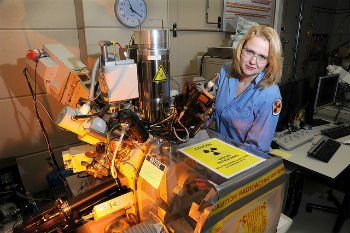Employers and Universities: Work with us?

Your complete guide to apprenticeships in engineering
Engineers are creative inventors, finding answers to problems. One path to a career in engineering is to do an apprenticeship instead of going to university. Here we’ll explain the different types of engineering apprenticeships, the skills you’ll need and how to get started.
What are engineering apprenticeships?
As an engineering apprentice, you will learn while you earn. You will have a paid job, where you gain practical experience and valuable skills. Apprentice engineer jobs mean you’ll go to college at the same time, to study towards a professional engineering qualification.
There are three types of engineering apprenticeships, with programmes available at the intermediate, advanced and higher levels of apprenticeship. Each programme will provide different qualifications.
'Love puzzles? Logical thinker? Start your engineering career with an apprenticeship'
Some apprentice engineer jobs will also let you study towards tech-levels, which are level 3 vocational qualifications including, among others, BTEC Diplomas, NVQs and HNDs. (Learn more about all the different kinds of vocational qualifications). These tech-levels show employers that you have the skills and knowledge necessary for a career in engineering.
There are also degree apprenticeships in engineering. These allow you to study for an engineering degree while working at the same time. Instead of the debt involved in going to university, you'll actually be paid to get a degree!
Tomorrow's Engineers has this handy booklet about the apprenticeship routes into engineering.
What are engineering apprenticeships?
As an engineering apprentice, you will learn while you earn. You will have a paid job, where you gain practical experience and valuable skills. Apprentice engineer jobs mean you’ll go to college at the same time, to study towards a professional engineering qualification.
There are three types of engineering apprenticeships, with programmes available at the intermediate, advanced and higher levels of apprenticeship. Each programme will provide different qualifications.
'Love puzzles? Logical thinker? Start your engineering career with an apprenticeship'
Some apprentice engineer jobs will also let you study towards tech-levels, which are level 3 vocational qualifications including, among others, BTEC Diplomas, NVQs and HNDs. (Learn more about all the different kinds of vocational qualifications). These tech-levels show employers that you have the skills and knowledge necessary for a career in engineering.
There are also degree apprenticeships in engineering. These allow you to study for an engineering degree while working at the same time. Instead of the debt involved in going to university, you'll actually be paid to get a degree!
Tomorrow's Engineers has this handy booklet about the apprenticeship routes into engineering.
What are the different types of engineering apprenticeships?
Apprenticeships in engineering are incredibly varied – there’s everything from building and repairing ships, to designing cutting-edge equipment that helps cut air and water pollution. Here we’ll take a look at a handful of the different types of engineering apprenticeships you could apply for:
Electrical engineering apprenticeships

Engineers working in this area fix and maintain machines, generate the electricity that powers these machines. They even design new faster and more efficient machines.
Electrical engineering apprenticeships could see you working on people’s homes or on huge industrial projects. Depending on the programme, you will learn: basic engineering drawing; how to maintain electrical equipment and systems; how to put together and test electronic circuits and wiring.
Mechanical engineering apprenticeships
The skills of mechanical engineers are relied on in many different sectors, including manufacturing (eg building engine and gear parts; repairing robots in factories); power and processing (eg designing machines for factories and pumps for energy companies); buildings (eg mending lifts and installing heat systems); and transport (eg fixing the mechanical parts of train engines).
Their abilities include welding, hydraulics, pneumatics, fluid mechanics, computer-aided design (CAD), and computer numerical controlled (CNC) machining (which means using computers to control machine tools).
Depending on the particular scheme, an advanced apprenticeship would train you to become a fully skilled and qualified mechanical engineer in three years.
Manufacturing engineering apprenticeships
Manufacturing engineers design everything from planes to mobile homes – everything that makes our world tick.
As an apprentice at the intermediate level, you can choose between different pathways, including aerospace; marine (ship, yacht and boat building, maintenance and repair); mechanical manufacturing engineering; engineering maintenance and installation; fabrication and welding; materials processing and finishing; and engineering technical support.
Your tasks will vary according to the pathway you choose and your employer. You’ll gain practical expertise, transferable skills and sector knowledge that will mean you can progress to a semi-skilled operator role in various areas of engineering. You’ll learn about safety procedures, how to communicate technical information and how to identify engineering equipment.

And at the higher apprenticeship level, you could train in roles such as manufacturing engineer; design engineer; software engineer; or aircraft systems development technician.
There are also manufacturing engineering apprenticeships at the degree level.
Civil engineering apprenticeships
Civil engineering involves designing, constructing and maintaining our built environment (that means everything in our surroundings that is man-made, for example buildings, roads and parks).
During the intermediate civil engineering apprenticeships you could work as a construction operative, working on a construction site or public place, laying drainage, installing street iron works, laying pavements and excavating holes and trenches. Or your role could be a highways maintenance operative, working in a public place or highway, repairing surfaces, and laying drainage.
At the advanced level you could be trained as a plant mechanic, working on a construction site or in a workshop carrying out maintenance and repairs to excavators, cranes, and trucks. You could then specialise in hydraulics and electrical components.
There are also opportunities to study towards a degree during your apprenticeship.
Engineering environmental technologies apprenticeships
This area of engineering has developed because of the negative effects of industrialisation on our planet – problems like global warming, air pollution, toxic waste and acid rain. Because of these issues, we need engineers who can make the world’s manufacturing, construction and building sectors more environmentally friendly.
As a higher apprentice, you will learn how to solve serious environmental problems and how new technologies can make our world greener. The higher engineering environmental technologies apprenticeship offers three possible routes: construction and the built environment; manufacturing; or building services.
Depending on the route you go for, your tasks could include:
- Managing the sustainability of construction projects.
- Reducing the impact that manufacturing sites are having on the environment.
- Installing equipment in a way that uses the least power, and reduces air and water pollution.
- Giving advice on how the buildings sector could reduce its carbon footprint, for example plumbing and heating systems that use less energy.
This apprenticeship is for people who have already working as a craftsperson or technician, or have done a level 3 apprenticeship in a related industry. You will need knowledge and skills in engineering in order to apply.
Important note! We have selected just a few apprenticeships in engineering you could do, but there are plenty more. We recommend that you start by checking out The Institution of Engineering and Technology’s engineering areas. Then when you’re ready to find an apprenticeship, use Tomorrow's Engineers search tool.
What skills do I need?

Here are a selection of skills and qualities you would need. (Bear in mind that the different types of engineering apprenticeships each require their own set of skills, so this is just a guide).
- Able to work as part of a team.
- Dedicated, conscientious and reliable.
- Practical and hands-on.
- Real interest in engineering.
- Hardworking.
- Able to communicate complex information.
- Numeracy skills.
- Organised.
- Able to work on your own initiative.
- Great at managing your time.
- Able to think technically and analytically.
- Curious.
- Happy working in a factory or industrial environment.
And what qualifications do I need?
You’ll usually need at least GCSEs of grade 4 / C or above in Maths and English. For the more advanced apprenticeships, you may need a previous apprenticeship qualification and/or A-levels. The entry requirements vary a lot so the best thing to do is check the job listing you’re interested in.
Are apprenticeships in engineering for you? Check out opportunities on our site.
Related posts
Becoming an engineer: Tara shares her “I made that” moment
What are the different types of engineering jobs?
60 Second Interview: Formula 1 engineer
Image credits
Main image, drawing via Freepik; aerospace engineer via Wikimedia Commons; nuclear engineer by Idaho National Laboratory via Flickr
